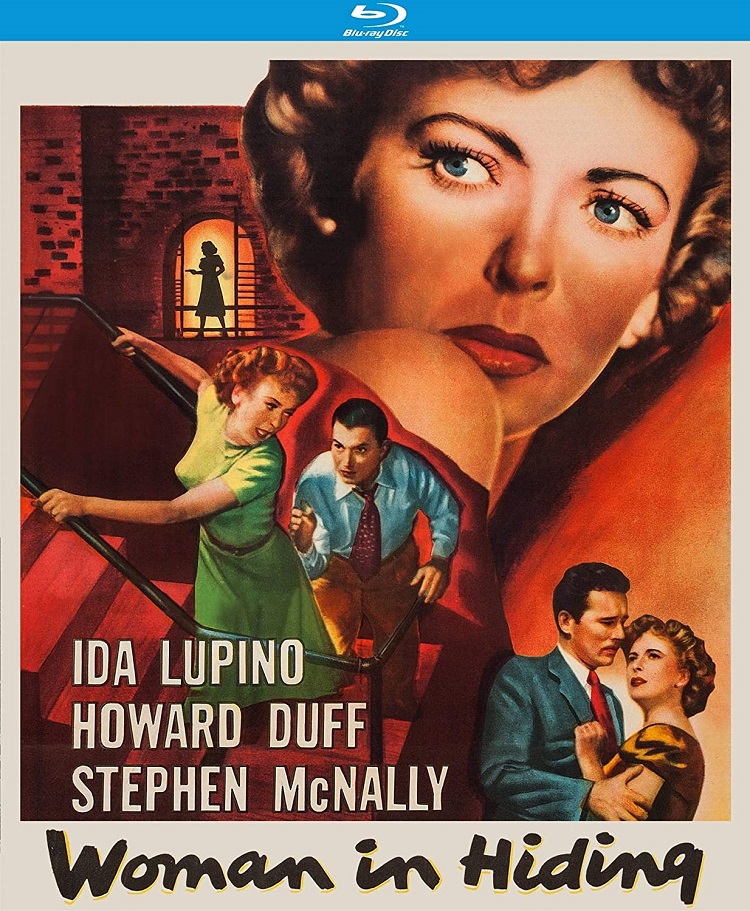
It is funny how when you discover something you’d never noticed before you suddenly start seeing it everywhere you look. Ida Lupino has been that way with me recently. Her’s was a name I’d heard before but wasn’t really familiar with. It was one of those names I’d seen in reviews or movie discussions that stuck in my brain but that I didn’t really associate with anything. I’d seen her in High Sierra with Humphrey Bogart years ago, but whatever impression she left had long since slipped my memory. Then a few weeks ago I randomly watched On Dangerous Ground. Lupino plays a small, but memorable, role towards the end of the film. I was mesmerized by her. A couple of weeks later I had a boxed set of films she had directed to review. Now here I am reviewing her turn in this film-noir from 1951. In just a few months, I’ve gone from barely knowing her name to quickly becoming a super-fan.
What I love about Lupino as an actress is that she can simultaneously look both vulnerable and tough. If she was around today, they’d probably make her a big action star. A Linda Hamilton-type who has no fear and kicks butt with more fervor than her male counterparts. But Lupino never loses her femininity. She’s tough for sure, but she can also be terrified, and often needs a man to rescue her. There is plenty of heart with her brawn.
Here, she plays Deborah Chandler, a woman who marries the wrong man and immediately regrets it. He’s Selden Clark (Stephen McNally), a man who works for her father’s mill and has big plans. The father doesn’t like Selden and warns Deborah off of him at first, but he’s always been nice to her and there isn’t anybody else in this town anyway. Still, she doesn’t marry him while the father is alive. But when he dies in an accident at the mill, swallowed up by grief, she agrees to marry Selden.
On their honeymoon, she learns the truth. Selden murdered her father to take control of the mill and doesn’t mind doing the same to her if she gets in his way. That night, she escapes the mountainside cabin they are taking their honeymoon in only to learn that Selden cut the brakes as she flies down the mountain with no way to stop. She manages to jump out just before the car flies off a bridge and into the river.
The local authorities figure she died in the crash but when they don’t find a body, Selden isn’t so sure. He offers a $5,000 reward for her return, which is published in all the nearby newspapers. Meanwhile, Deborah takes a bus to the nearby city of Raleigh, with no idea of what to do next. She fears that if she goes to the authorities they won’t believe her story and will push her into getting back together with Seldon.
The film never quite makes me believe this. In the moments after the crash, I can see why she would run, but there are several scenes later in the film where the police come near her and she’s scared out of her mind. But she’s not a criminal, she hasn’t escaped prison, so there is no reason the authorities would be looking for her. And if they did recognize her, it seems logical that she could explain the situation and there would be an investigation. So we suspend that disbelief a little and move on.
Keith Ramsey (Howard Duff), an ex-GI who is just drifting about, recognizes her from her picture in the paper, follows her about a bit, then calls Selden in hopes of getting that money. In the meantime, he gets to know her and naturally falls for her. It all leads up to an exciting chase scene back at the mill and an ending that’s supposed to be sweet but winds up being strange and somewhat menacing.
Director Michael Gordon keeps things moving quickly and fills the film with one tense scene after another. They don’t always work – see my comments above about her run-ins with the law for an example – but they often do. There is a wonderful scene in a motel in which there is some kind of convention that’s turned into a massive party. It is loud and chaotic and quite chilling. The big finale sequence at the mill is a stunner.
The cinematography is by William H. Daniels, who creates magic with his use of light and shadows. It is this that really makes the film a noir as the plot is much more melodramatic. I’ve been watching a lot of classic film noir these past few weeks and the photography in this holds up against the very best.
The entire cast is great but Lupino remains the standout. In a lesser actress’ hands, Deborah would a sniveling, shrieking, wimp. Lupino certainly gives the character the face of someone who is afraid (and suspicious looking to any cops that actually looked at her) but there is an undercurrent of strength. She relies on Keith to save her, but she’s not afraid to fight back either.
All in all, it is a terrific little noir that’s a little light on story, but elevated by some great photography and a fine performance from Lupino. Well worth seeking out once you’ve watched all the classic noir.
Kino Lorber presents Woman in Hiding with a 1080p transfer and a 1.37:1 aspect ratio. Extras include an audio commentary by film historian Kat Ellinger and trailers for upcoming releases by the company.